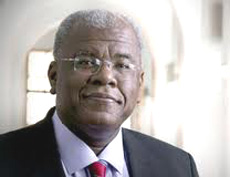


|
HOW does social change happen? On the most fundamental level, it happens through leadership. The reality of our country is that it is without leadership. That does not mean we do not have several people pretending to be leaders or who carry the formal title of leader. We are in serious trouble. Out value system is eroded. The problem with South Africa is that we may look okay, but we are certainly not okay. We are more wounded than we think. It is not difficult to find clear examples that illustrate what happens when you have a wounded country without leadership. Let me give you an example. Newspapers recently ran front-page stories about a pack of dogs in a squatter camp that apparently mauled a young child to death. What stood out for me was that the response of people in the community was to get sticks, stones and bricks, and hunt down and kill every stray they could find. Where does that behaviour come from? The present is not its own explanation – such dangerous behaviour always comes from somewhere. Another example of our woundedness occurred recently in the settlement of Diepsloot, to the north of Johannesburg, where a community erupted in anger because of rampant crime in their area. What was interesting was that they set out to look for the culprits. They expressed their despair and rage by beating to death a Zimbabwean man. The incident made the front page of the New York Times Magazine. Again, we should be asking: where does this behaviour come from? We are not far from a South Africa where people who are fed up with poverty and a lack of good governance are starting to look for scapegoats. When that happens, the first level on which culprits in our society will be identified is by their race, and the second by their ethnicity. As a nation we have a trauma that is not yet resolved, a deep hurt that has not yet been taken care of. What is lacking is leadership for dealing with our woundedness. It is not only a crisis of political leadership; it is also a crisis of corporate leadership. We also have a crisis of religious leadership, as is clear from the number of priests said to molest children. We certainly have a crisis of educational leadership, coupled with a crisis of parental leadership, where basic, core values are not taught in the home. This is not just about Jacob Zuma. It is a crisis that affects all of us, and the change that is so desperately needed must start with each one of us as individuals. If we really want social change, we have to deal with the issues of leadership that effect our country. What I have learnt about good an effective leadership is that it propels people in the direction of change. The first step is to be sure that we know what kind of leadership we are talking about. First, we need authoritative leadership, as opposed to authoritarian leadership. There is a distinction between authoritative and authoritarian leadership. Authoritarian leadership bullies people into accepting change from the top. Authoritative leadership accepts the responsibility to lead, consults broadly, then acts on the mandate to change. Authoritative leadership is a prerequisite for social change. At the moment, the leadership of this country fails to act on what is wrong in a decisive manner; in short we lack authoritative leadership. Let’s discuss a recent test of leadership. I am not a particular fan of the Western Cape Education Department, but I believe they are correct in certain areas. An example is their insistence on ensuring that those who mark matric exams are competent to do so. Not only must a marker have all the usual qualifications, they must also show that the children in the school where they teach a particular subject are achieving more than 70 percent. This had the South African Democratic Teachers Union up in arms, and it is a resistance that more than ever calls for authoritative leadership on the part of the department. If the Western Cape Education Department gives in on this issue, then we are lost. Our current political leadership does not have the guts to take on the unions. Forget about systemic change in education, it is not going to happen. We are the only country in the world other than Mexico where unions run the schools. I find it particularly revolting that the people who are ruining our township schools have their own children at elite schools. Authoritative leaders have the courage to stand up and put the interests of the children above all other considerations. Second, we need ethical leadership , not opportunistic leadership. The late RO Dudley, the famous teacher, put it this way in his question to the ruling party: “What do you stand for, and what you will fall for?” Ethical leadership is based on a core set of beliefs about what is right and wrong, and it applies not just to your government, but also to the way you run your business and live your life as an individual. It was opportunistic leadership that made a decision that still makes me shudder: when South Africa refused a visa for the Dalai Lama on the grounds that he was a threat to world peace. There is a story I heard from a famous South Africa visiting a foreign country – he was told by is hosts: “We don’t have a problem with Jacob Zuma as your president. Our problem is that you chose him.” If we have the kind of collective leadership that makes decisions based on what is personally convenient, on what will enrich me as a person, based on what is politically correct , then you have the worst kind of opportunistic leadership. And that means we are in serious trouble. Ethical leadership is a prerequisite for social change. Third, we need broken leadership. We have to understand the distinction between broken leadership and self-assured leadership. An example of broken leadership can be found in the decision that we took to confront our hurts and allow the four young men from the Reitz hostel at the University of the Free State to continue their studies. The starting point for the leadership was that we are all affected by our terrible past. We are all, black and white, suffering from post-traumatic stress and, in our complex past, there are no grounds for self-righteousness. Brokenness in leadership starts with the notion that we are all imperfect. Unless I confront my own brokenness, I cannot deal with anyone else’s. I must start with the notion that I do not have clean hands. I struggle with the same things you do. It is the opposite of self-assured leadership, the attachment to self-righteousness, that lands us in trouble. I firmly believe that we got into this mess together, and that the only way out of it is together. We need more of the uncommon grace that was demonstrated by the Rev Ross Anderson after the St James Church massacre when he met the Apla cadres who had killed 11 members of his congregation. He said to them: “I want to tell you that I am sorry for my role in apartheid.” This is true broken leadership. Finally, we need exemplary leadership , and we need to understand the difference between exemplary leadership and preacher leadership. Exemplary leadership teaches you how to live with your neighbour. Nelson Mandela has not led a perfect life, but what was amazing about him is that he used his brokenness to present an example the whole world recognizes as exceptional. I am sick and tired of people calling each other by names such as coloured or white or black. The first thing we should recognize is our common humanity, not the accident of genetics that has determined the amount of melanin in our skins. What we now have in South Africa’s political leadership is temporary. It is a madness that will go away. As South Africans, we still have an unbelievable capacity for goodness, but it is going to depend on all of us to restore true leadership – without which we cannot have social change. |
||||
| * Professor Jansen is the vice-chancellor of the University of the Free State. This is an edited version of his Annual Social Change Lecture at the Tertiary School in Business Administration (TSiBA) in Cape Town. July 2011. | ||||
This Web Page Created with PageBreeze Free HTML Editor